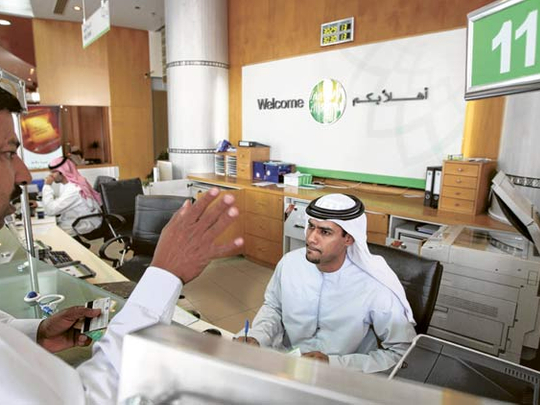
Sharjah: The finance, insurance and currency exchange sectors are employing fewer Emirati nationals than their targets for the year, according to the latest Emiratisation study.
The Emiratisation rate in the insurance sector has not exceeded 6.5 per cent in the past 15 years, more than 40 currency transfer companies do not employ Emiratis and a third of banks have just under 20 per cent Emirati employees, said Ahmad Humaid Al Tayer, Director of the National Human Resources Development and Employment Authority.
The total Emiratisation rate dropped to 5.86 per cent in the insurance sector in December 2010 compared to 6.01 per cent in the same period last year, according to the study released by the authority.
The rate of Emirati branch managers in the insurance sector dropped to 6.4 per cent in 2010 from 7.3 per cent the previous year.
The number of Emirati employees who quit their insurance jobs reached 133 people, representing 30 per cent of the Emirati insurance employees.
Currency exchanges also lagged behind their Emiratisation targets.
None of the large companies, with over 200 employees, reached the required rate of four per cent, the study said. Medium companies with 50 to 199 employees also did not achieve their required rate of 3 per cent.
The total number of Emirati employees working in currency exchange companies dropped by 3.8 per cent to 406 Emiratis in 2010.
Blaming each other
Emirati employees and these institutions seemed to lay the blame on one another for these results.
"Financial institutions have not matured enough internally to attract and retail nationals. They did not initiate programmes and packages to attract them. I mean salaries, training, work environment, work hours and career progress," Eisa Ali Al Za'abi, deputy general manager of the Emirates Insitute for Banking and Financial Studies, told Gulf News.
Some expat employees are reluctant to educate and train Emiratis because they fear that the nationals will replace them, said Rehab Lootah, Committee Chairman of the Women Advisory Committee in Banking and Finance.
Low salaries
Insurance and currency exchange companies find fault with some Emiratis' attitudes towards working in the private sector, specifically finance.
"There are not a lot of applications from them. They haven't absorbed the idea of being an employee behind a desk processing insurance," said Alaa Hammoudeh, Executive Human Resource personnel at Takaful Emarat, an Islamic insurance company.
Salaries are lower compared to banks and industries and they prefer government jobs, he said.
"They have to think of developing themselves. They leave the hard job and take the easy job," he said. "The first questions I get asked are about salaries, weekends and work timings."
Meanwhile expats are pleading to be hired, he added. With the adequate education and qualifications, there would be no problem hiring them at higher positions, he added.
The low rate of Emiratisation in currency exchanges is due to the fact that most money transfers are made to South Asia and the Philippines, so companies must hire employees of different nationalities to communicate with the diverse clients, said Marwan Al Mazroui, Executive Director of UAE Exchange.
The banking sector had the best rate of Emiratisation, 35.4 per cent, according to the study. The number of Emirati bank employees increased 1.1 per cent to 12,993 people in December 2010 compared to the same period the previous year.












